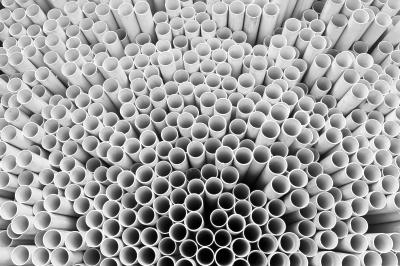First published in the Independent on Sunday
“Beware of all enterprises that require new clothes”, said Henry David Thoreau, the American philosopher. Had he been a builder he might have said, “Beware of all enterprises that require new materials”, because stepping into the unknown is always a risky business, as much with your home as with your career.
Of course, by “new” I mean new super duper, rather than new just out of the packaging. After all, there’s nothing wrong with freshly-burnt bricks, recently-quarried stone or newly-seasoned timber; the characteristics of all these materials are known and understood, so we can use them in situations where they will perform well for years.
No, it’s the “new generation” materials – specifically plastics – that we should be wary of. They haven’t been around long enough for us to assess their limitations – and they are being promoted for uses that they are clearly not up to. Plastic guttering creaks and groans in the sunshine as it expands and contracts, and the inevitable result is that it comes apart at the joints and lets rainwater run down the walls. There is growing evidence, too, that plastic pipes leach chemicals into the drinking water which can make men infertile. There is a historical irony here – it is said that the Romans went mad through lead poisoning from their water pipes; and now, 2000 years later, we are wiping ourselves out with ours.
Plastics may appear stable, but they can get quite nasty when asked to mix with other plastics – PVC-sheathed electrical cables and expanded-polystyrene loft insulation, for example, combine to form a sticky goo which eventually leaves the wires exposed and liable to start a fire in the roof space. If you have this combination in your home than get it checked out.
But of more widespread concern is the fact that plastic water pipes are now used for repairs and alterations to home plumbing systems, which may lead, paradoxically, to risk of electrocution.
Let me explain: water conducts electricity; that’s why you shouldn’t have electrical sockets or light switches in the bathroom. So any metal object in contact with water, such as a stainless steel sink, a central heating radiator or even the steel taps on an acrylic bath, could become electrically live if a short-circuit occurs somewhere else in the building. So for safety these common household fixtures must be connected to earth with thick green-and-yellow-sheathed earthing cable – the process is called earth bonding. In the past, when all water and gas pipes were copper or lead, it was sufficient to earth bond the kitchen sink to the nearest pipe, because the whole plumbing system was connected to a proper earth at the electricity company fuse board.
The introduction of plastic pipes, however, has meant that the earth bonding may be interrupted, because plastics do not conduct electricity; so if by accident the sink should become live, there will be nothing to conduct the electricity away safely to earth. Even one push-fit plastic pipe connector will be enough to break the circuit.
Plastic pipes may have a part to play in the future of construction, but just now they are posing a few questions. If you think you may have plastic anywhere in your plumbing system then play safe and get your earth bonding checked by an NICEIC approved electrician.





